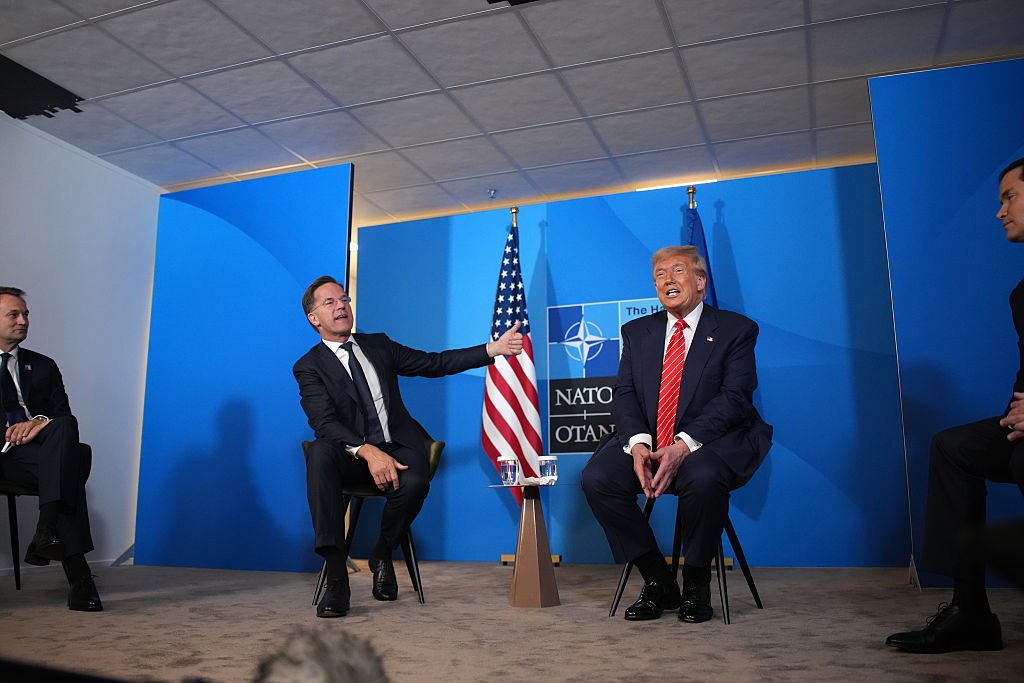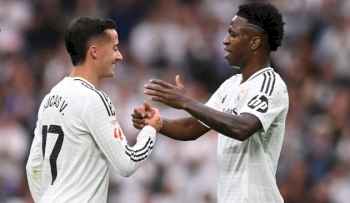The Trump Era of Flattery Diplomacy is Here

“Flattery will get you everywhere.”
That line, attributed to the actress Mae West, came to mind Monday, watching NATO Secretary General Mark Rutte cheer as President Donald Trump—for the second time in as many months—announced a 180-degree u-turn in his administration’s foreign policy.
[time-brightcove not-tgx=”true”]Trump said the U.S. would sell “billions of dollars worth” of offensive and defensive weaponry to Europe for transshipment to Ukraine. And he issued an ultimatum to Russian President Vladimir Putin: make peace with Ukraine in 50 days, or face sanctions against your country and those who do business with you.
Until Monday, Trump had made no such pledges for Ukraine, and few demands of Putin—certainly none with a clear “or else” attached.
A few weeks earlier, at the NATO summit in The Hague, Rutte beamed as Trump pledged his full-throated support for the alliance. It was another about-face; on the eve of the summit Trump had equivocated on U.S. security commitments to NATO, and his disdain for the alliance was longstanding. Now he was a NATO booster.
What changed, exactly? And what’s flattery got to do with it?
Nearly everything, it turns out.
Both Trump turnarounds can be traced to Rutte, the former Dutch Prime Minister who took the reins at NATO last October and has had a stunningly successful couple of months. At the June summit, he won pledges from members to spend 5% of GDP on defense, and ringing endorsements from Trump. And there was Rutte in the Oval Office Monday, a key broker of the new deal for Ukraine.
What happened to alter the course of these U.S. policies? Among other things, Rutte showed the world how Trump flattery is done; Ukraine’s President Volodymyr Zelensky took something of a crash course in the same subject; and Putin, resting on his long-held view that Trump would never cross him, skipped the flattery, made over-the-phone promises to Trump and then broke them.
Read More: Why Trump’s U-Turn on Ukraine Matters
If it seems frivolous to suggest that a polishing of the commander-in-chief’s ego has turned the tide of global affairs, consider Trump’s relationship with NATO.
On the campaign trail in 2016, Trump called NATO “obsolete” and threatened to pull the U.S. from the alliance. More recently he said, of member nations that didn’t pull their weight, “I would not protect you…In fact, I would encourage [the Russians] to do whatever the hell they want.” On the eve of last month’s summit, he refused to publicly commit the U.S. to NATO’s Article 5, which compels every member to come to the defense of another.
As for Ukraine, in February Trump called Zelensky a dictator, berated him in that now-infamous Oval Office meeting, and offered to reopen commercial and diplomatic ties with the Kremlin—a stinging blow to Ukraine and NATO both. No new American aid pledges for Kyiv were in the works.
Enter Rutte, who knew Trump from his time as Prime Minister, and who got to work buttering up the American president.
He began by repeatedly crediting Trump with prodding NATO members to boost their defense spending. At the White House in March, Rutte said, NATO nations “want to work together with you… to make sure that we will have a NATO which is newly invigorated under your leadership.” That was fair enough—not overly fawning, and largely true. Trump wasn’t the only leader to push for more NATO military spending, but no president had pressed the point harder.
On the eve of the June summit, Rutte took things to another level. While leaders across Western Europe were condemning or questioning Trump‘s air strikes against Iran, NATO’s leader cheered them on.
“Congratulations and thank you for your decisive action in Iran,” Rutte wrote in a private message that Trump quickly made public. “That was truly extraordinary, and something no one else dared to do. It makes us all safer.”
In the same message, Rutte linked the Iran strikes to the coming summit.
“You are flying into another big success in The Hague this evening. It was not easy but we’ve got them all signed onto 5 percent! Donald, you have driven us to a really, really important moment for America and Europe, and the world,” applauded Rutte. “You will achieve something NO American president in decades could get done. Europe is going to pay in a BIG way, as they should, and it will be your win. Safe travels and see you at His Majesty’s dinner!”
To some the missive reeked of sycophancy.Spain’s El Pais called Rutte’s performance “flattery diplomacy, bordering on outright vassalage.” But even critics could admire the tactics. Rutte wasn’t just flattering the president, he was using Trump’s syntax (“big success,” “your win,” etc.), the occasional word in CAPS, and the use of exclamation marks too.
At the summit, Rutte called Trump a “man of strength…and peace,” and when the subject of Middle Eastern diplomacy arose, the NATO leader said of Trump, “Daddy has to sometimes use strong language to get them to stop.”
It’s hard to overstate the White House shifts that followed. Rutte won an alliance statement, agreed to by the U.S., that Russia was “a profound security threat” (the Trump Administration previously hadn’t even agreed to name Russia as the “aggressor” in Ukraine), along with a “commitment to NATO” and to Article 5. “100 percent,” Trump said of the latter—having refused, three days earlier, to commit to it at all.
If there was any doubt that the flattery had done its work, Trump put that to rest. “They were so respectful of me,” he said. After all those years spent blasting NATO members for “ripping off” the U.S., Trump said, “I left here differently…It’s not a rip‑off, and we are here to help them protect their country.”
President Trump said he was grateful for the hospitality at the summit. “I want to thank them for the royal treatment,” he said of his hosts at The Hague. “Couldn’t have been nicer.” Trump also singled out Rutte: “He’s been terrific.”
This week it was Ukraine’s turn to enjoy the fruits of the flattery. The arrangement announced Monday—the U.S. sells weapons to Europe, Europe delivers them to Ukraine—was brokered by Rutte. Once again, the NATO Secretary General was in the Oval Office for the announcement, and ready to heap praise on the American president.
“This is a clear signal that President Trump is serious,” Rutte told Fox News after the announcements. “He wants peace. He hates the fact that so many people lose their lives in Ukraine.”
Until recently, Trump had evinced few such sympathies. But since that Oval Office debacle, Zelensky had done his Trump homework, too. He wrote to Trump in early March extolling the president’s “strong leadership” and thanked him effusively for a six-year-old gift of anti-tank weapons. “The moment when things changed [was] when President Trump provided Ukraine with Javelins,” Zelensky wrote. (A stretch, perhaps, given that the Javelins were sent three years before Russia’s full-scale invasion).
In a long message on X, Zelensky praised “President Trump’s concept of peace through strength,” and in April he applauded Trump’s “vision” after a meeting at the Vatican—“our best conversation yet,” he said. Every Zelensky message was a blend of praise and gratitude, leavened with reminders about what the Kremlin was up to.
Which brings us to Putin. Theories abound as to why Trump has so regularly stood by the Russian leader. Trump praised him as a “savvy” statesman, a “genius,” and in 2018, a man Trump said he trusted more than his own intelligence community.
Whatever the case, Putin—a longtime Trump flatterer himself—may have imagined he no longer needed to play that game. He watched the Zelensky-Trump meltdown, took the calls from Trump and his envoys, made pledges and broke them. And at some point over the past few weeks and months, as Rutte and Zelensky were playing their hands , something changed.
Trump stopped calling Zelensky a dictator. After a meeting on the sidelines of the NATO summit, Trump said Zelensky “couldn’t have been nicer,” and commended him and the people of Ukraine for fighting “a brave battle.” As for Putin, Trump blasted his “bullsh-t” promises, something other leaders and analysts had been familiar with for years.
Read More: Finally, Trump Seems to Get Putin
Then came this week’s weapons deal along with more sympathy for Ukraine and more praise for NATO and its leader.
Rutte has made no apologies for his approach to Trump. “I think when somebody deserves praise, that praise should be given,” he told The New York Times. As for those who skewered him for over-the-top flattery, he said, “I know about criticism, but I don’t care. In the end, I need to do my job. I have to keep the whole of NATO together. And the biggest ally is the United States.”
Neither Rutte nor Zelensky can claim the prize of flatterer-in-chief; surely that honor goes to Israel‘s Benjamin Netanyahu, who last week nominated Trump for the Nobel Peace Prize and handed his nomination letter to Trump, as the cameras rolled. “It’s well deserved, and you should get it,” Netanyahu said.
But Israel hardly needed a sea change in the Trump view of his country. Neither did the Qataris who gifted Trump a luxury jet, nor British Prime Minister Keir Starmer, who handed Trump an invitation from King Charles for a state dinner. In the case of NATO and Ukraine, however, they were in rough waters, as it were, and in their own ways, both were desperate for American support, and a turning of the tide.
Of course things can change quickly in the Trump world view, and the pendulum may swing back. But for now this much seems clear: Ukraine will get more U.S. weapons, and NATO will get more robust American support, because a pair of world leaders were good students of how best to flatter the American president.
As Mae West might have said, sometimes a little flattery can go a long way.



